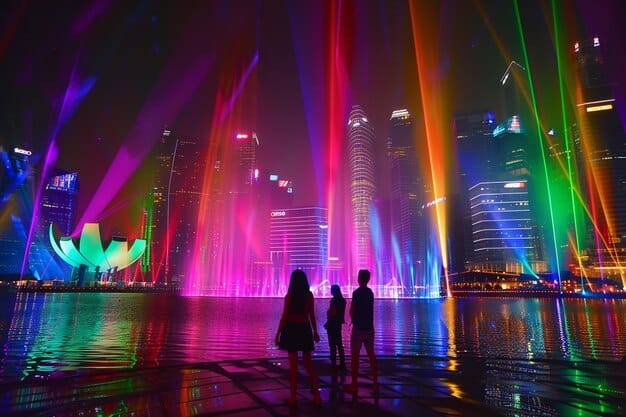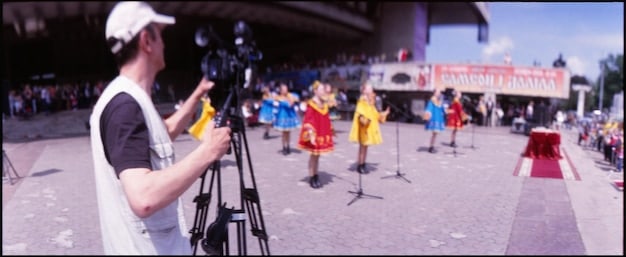The Future of Music Festivals: Will Virtual Concerts Dominate by 2027?

The Future of Music Festivals: Will Virtual Concerts Become the Norm by 2027? explores the potential shift towards virtual concerts becoming a standard component of the music festival experience, analyzing technological advancements, changing consumer behaviors, and the enduring appeal of live music.
The way we experience live music is evolving, and the question on everyone’s mind is: **The Future of Music Festivals: Will Virtual Concerts Become the Norm by 2027?**
Reimagining Music Festivals: The Rise of Virtual Concerts
The traditional music festival, a gathering of thousands in muddy fields, is facing a digital transformation. Virtual concerts are no longer a novelty but a growing force, prompting many to wonder about their long-term impact.
This section explores how virtual concerts have emerged as a viable alternative and a potential complement to traditional festivals. We will look at the ways technology is reshaping the live music experience.
The Pandemic’s Influence on Virtual Events
The COVID-19 pandemic served as a major catalyst for the adoption of virtual concerts. With live events canceled, artists and organizers turned to digital platforms to connect with audiences.
Evolving Technology Enhancing the Experience
Advancements in virtual reality (VR), augmented reality (AR), and streaming technology are constantly improving the quality and immersiveness of virtual concerts.
- Enhanced visuals and sound create a more engaging viewing experience.
- Interactive elements allow audiences to participate in the show.
- Accessibility increases, allowing anyone with an internet connection to attend.
These factors are collectively contributing to the growing appeal and potential future dominance of virtual concerts. As technology continues to evolve, the line between the physical and digital music experience blurs further.

Advantages of Virtual Music Festivals
Virtual music festivals offer a range of compelling advantages that are attracting both artists and audiences. These benefits span convenience, accessibility, and environmental considerations.
This section examines the key advantages of virtual festivals, highlighting why they are increasingly popular.
Global Accessibility and Inclusivity
Virtual festivals eliminate geographical barriers, allowing fans from around the world to attend without the cost and hassle of travel.
Cost-Effectiveness and Convenience
Attending a virtual festival can be significantly cheaper than a physical one, saving on travel, accommodation, and other expenses. They also offer the convenience of enjoying live music from the comfort of your own home.
Environmental Sustainability
Virtual festivals have a much smaller carbon footprint compared to traditional events, reducing travel-related emissions and waste generation.
- Reduced travel and accommodation needs.
- Lower energy consumption for event infrastructure.
- Minimized waste generation through digital ticketing and online merchandise.
By offering these advantages, virtual music festivals present a compelling alternative for those seeking a more convenient, affordable, and sustainable way to enjoy live music.
Challenges Facing Virtual Music Festivals
Despite their advantages, virtual music festivals face several challenges that need to be addressed to ensure their long-term success. These challenges range from technical issues to replicating the unique atmosphere of live events.
This section delves into the key challenges facing the widespread adoption of virtual music festivals.
Technical Difficulties and Connectivity Issues
Reliable internet access and high-quality streaming are essential for a seamless virtual concert experience. Technical glitches and connectivity problems can disrupt the show and frustrate viewers.
Replicating the Live Music Experience
Creating the same sense of community, energy, and spontaneity as a physical concert is a major challenge for virtual events. The lack of physical presence and interaction can diminish the overall experience.
Monetization and Revenue Models
Developing effective monetization strategies for virtual concerts is crucial for their sustainability. Finding the right balance between ticket prices, sponsorships, and merchandise sales can be difficult.
Overcoming these challenges will be critical for virtual music festivals to evolve and become a truly viable and sustainable alternative to traditional events. Continuous innovation in technology and creative approaches to audience engagement will be key.

The Hybrid Model: Blending Virtual and Physical Experiences
One potential solution to the challenges facing virtual music festivals is the hybrid model, which combines elements of both virtual and physical experiences. This approach aims to offer the best of both worlds, catering to a wider audience and enhancing the overall festival experience.
This section explores the different ways hybrid festivals can be implemented and their potential benefits.
Simultaneous Live and Virtual Performances
Hybrid festivals can feature live performances streamed to a virtual audience, allowing fans from around the world to participate in real-time.
Interactive Digital Components
Incorporating interactive elements, such as virtual meet-and-greets with artists, behind-the-scenes content, and online games, can enhance the virtual audience’s engagement and sense of community.
Exclusive Virtual Experiences for Physical Attendees
Physical attendees can benefit from exclusive virtual experiences, such as augmented reality overlays, interactive maps, and personalized schedules, enhancing their overall festival experience.
- Expanded reach to a global audience.
- Increased revenue streams through both physical and virtual ticket sales.
- Enhanced engagement and interaction for both physical and virtual attendees.
By strategically combining the best aspects of both virtual and physical events, hybrid festivals can create a more immersive, accessible, and sustainable music festival experience.
Technological Innovations Driving the Future of Music Festivals
Technological advancements are fueling the evolution of music festivals, both virtual and physical. From improved streaming quality to interactive virtual environments, technology is transforming the way we experience live music.
This section examines specific technological innovations that are shaping the future of music festivals.
Enhanced Streaming and Interactive Platforms
Advancements in streaming technology are providing higher-quality video and audio, creating a more immersive virtual concert experience.
Virtual and Augmented Reality Integration
VR and AR technologies are being used to create interactive virtual environments that allow audiences to explore festival grounds, interact with artists, and participate in immersive experiences.
Artificial Intelligence and Personalization
AI can be used to personalize the festival experience, recommending artists and activities based on individual preferences. Chatbots and virtual assistants can also provide real-time support and information.
These technological innovations are not just enhancing the virtual experience; they are also transforming the physical festival, creating a more connected, engaging, and personalized event for all attendees. The integration of these technologies will continue to drive the evolution of music festivals.
The Enduring Appeal of Live Music and the Community Experience
Despite the growing popularity of virtual concerts, the enduring appeal of live music and the community experience remains a significant factor in the music festival landscape. The energy of a crowd, the shared experience of witnessing a performance in person, and the opportunity to connect with fellow music lovers are all integral parts of the traditional festival experience.
This section explores the unique aspects of live music and community that virtual concerts cannot fully replicate.
The Energy of a Live Performance
The palpable energy of a live performance, the connection between the artist and the audience, and the spontaneity of the moment are difficult to replicate in a virtual setting.
The Sense of Community and Shared Experience
Attending a music festival is a social experience, a chance to connect with like-minded people and create lasting memories. Sharing the experience with others amplifies the enjoyment and creates a sense of belonging.
The Opportunity for Discovery and Serendipity
Live music festivals provide opportunities to discover new artists, stumble upon unexpected performances, and experience serendipitous moments that cannot be planned or replicated online.
While technology continues to enhance the virtual music experience, the unique and irreplaceable aspects of live music and community will ensure that physical festivals continue to play a vital role in the music landscape. The future likely lies in a balance between the two, with virtual elements complementing and enhancing the traditional festival experience.
| Key Point | Brief Description |
|---|---|
| 🌍 Global Accessibility | Virtual festivals remove geographical barriers. |
| 💰 Cost-Effective | Cheaper than physical festivals, saving on travel. |
| 🌿 Sustainability | Reduced carbon footprint and waste generation. |
| 🤝 Hybrid Model | Combines virtual and physical elements for broader appeal. |
Frequently Asked Questions (FAQ)
▼
It’s unlikely virtual concerts will entirely replace live festivals. The unique experience of live music and community is hard to replicate. The future likely involves a hybrid approach.
▼
The key benefits include global accessibility, cost-effectiveness, convenience, and environmental sustainability, allowing fans worldwide to enjoy music from home at a lower cost.
▼
Challenges include technical difficulties, replicating the live music experience, and effective monetization strategies to ensure profitability and sustainability for artists and organizers alike.
▼
Enhanced streaming, VR/AR integration, and AI personalization are creating more immersive and interactive virtual concert experiences, offering high-quality visuals, sounds, and engagement.
▼
The hybrid model combines live and virtual elements, such as simultaneous live streams and interactive digital components, offering the best of both worlds and catering to a broader audience.
Conclusion
In conclusion, while virtual concerts offer compelling advantages and are likely to become an integral part of the music festival landscape, they are unlikely to completely replace the unique experience of live music. The future of music festivals likely lies in a hybrid model that blends the best of both worlds, offering fans a more accessible, sustainable, and engaging way to enjoy their favorite artists.





